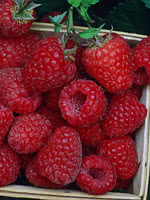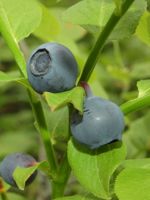Mon-Fri 9am - 5pm Mountain time
Encore Raspberry vs Bilberry
Rubus x Encore
Vaccinium myrtillus
NOT AVAILABLE THIS SEASON - MIGHT RETURN
CUSTOM GROW
Encore Raspberry ripens late season and features nearly spineless branches for easier picking. Its smaller, red berries are sweet and perfect for homemade jams, preserves, or eating straight off the plant.
Encore Raspberry is a floricane raspberry variety, meaning it only produces berries on second-year canes. Cut back dead two-year-old canes as needed, leaving last year's growth.
Bilberry is a native perennial shrub valued for its small, blue-black berries that ripen in mid to late summer. The berries resemble blueberries but have a richer, more tart, and intense flavor. They have long been used for fresh eating, baking, and preserves, while also providing food for birds and mammals. In spring, its delicate pinkish flowers attract bees and other pollinators.
Growing low to the ground, Bilberry forms spreading colonies that create dense understory cover. This growth habit provides food and shelter for wildlife, and its foliage adds seasonal interest by turning red to purple in autumn. With its adaptability and ecological benefits, Bilberry is well-suited for naturalization, ecological restoration, and pollinator gardens.
Encore Raspberry Quick Facts
Bilberry Quick Facts
Toxicity: leaves may be unsafe in high doses

